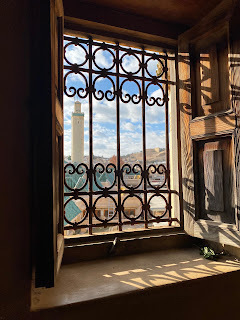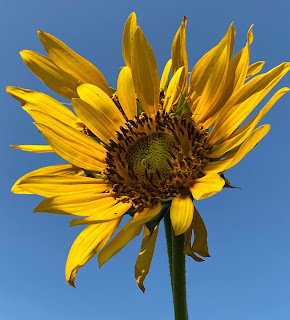Uncategorized
- They want to know why I continue to be a member of a church in an age when fewer and fewer people find themselves connected to traditional houses of worship or faith communities. (I have written about this in a few places, but you might like what I have written about prayer.)
- They wonder why I am still a professor in a small liberal arts college at a time when students seem disengaged, and when colleges are threatened by political headwinds, rising costs, apparent diminishing returns, and by our own decisions that weaken public opinion against us. (You can see a bit more of what I’ve written about the liberal arts here and here.
- And they wonder why I continue to work towards environmental sustainability in a place that doesn’t seem to value the environment, and where sustainability is viewed as a harmless hobby at best and a threat to business and freedom at worst. (My work focuses on the environmental humanities, and I’ve done a good deal of work in sustainability with my university, with my city, with our local zoo and aquarium, and internationally with organizations like IBM. You might also like this article I wrote about insects on Medium, but be forewarned that it is paywalled.)
- When it comes to faith, I often find others' stories more interesting than my own, and I’m glad to meet others who are seeking the way ahead with humble curiosity even if we use different words to talk about what we’re seeking and what we’re finding. So my calling is not to a building, or to a religion; rather, it feels like a consistent calling to love God and to love my neighbor as myself.
- When it comes to teaching, I have taught every age from pre-schoolers to older graduate students. I love it all. For now, I’m a tenured professor at the highest rank available to me. It took a lot of work to get here, and positions like mine are the envy of graduate students everywhere. I wouldn’t be surprised to see more and more schools eliminate tenure and reduce jobs like mine to some version of the gig economy (these things are already happening steadily around the world.) So if I were to leave this job, I’d be leaving something I probably would never find again. But I don’t feel the calling to comfortable tenure so strongly as I do feel the calling to meaningful teaching that helps others to flourish. So my calling seems always to tug me beyond my faculty office and my assigned classrooms.
- And when it comes to environmental sustainability, I often find myself scratching my head. Why wouldn’t we want to be not just good neighbors but also good ancestors? Why wouldn’t we want to pursue solutions that help people and the planet to thrive while also making sure we all flourish economically? I get it: so many of the solutions offered by environmentally-minded people threaten to cost us more in taxes, or they threaten particular practices or certain sectors of the economy. If someone came for my job or my hard-earned savings, I’d bristle as well. But it doesn’t have to be that way. We can make good use of the water we have AND we can make sure those who live downstream have clean water too. We can make good use of our soil without depleting it, and we can do it in a way that boosts profits. Etc. Here my callings all seem to come together: I feel called to help my neighbors — all of my neighbors — flourish, and to love them as myself. And to include as neighbors everything that lives, and everyone who might inherit this earth from me. I’d like my great-great-grandchildren whom I will likely never meet to look back on my life with gratitude.
Why Are You Still Here?
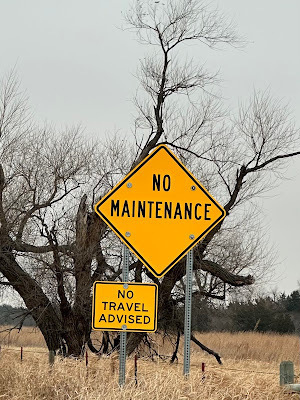
Should you be here? (I like roads like this one.)
Like my previous post, this one begins with a question others ask me fairly often:
“Why are you still here?”
Thankfully, when I hear this question people generally aren’t asking me to leave. Rather, they’re asking why I stay. And they’re usually asking about one of three things:
I have answers for each of these, and they’re all important. My faith matters to me. So does my community, and so does the environment my community inhabits. I want my neighbors to thrive, and that means I want them to live in a place that fosters health for the whole person: physical, emotional, mental, spiritual, and economic. And my idea of “neighbor” is fairly expansive, and it includes all those whose lives are connected to my own, including the lives of other species. Jesus once pointed out that not even a sparrow can fall to the ground without God noticing it. If the sparrows matter to God, then I’d like them to matter to me.
In other words, for me, these three questions people ask me are all related to one another.
I think they’re all also related to my vocation, and to my sense of calling. In some way I feel called to and by God; I feel like teaching is my vocation; and I feel called to be a good steward of all Creation.
Those “callings” are different, but they all also feel like “deep calling unto deep.” I can’t explain them, and I don’t mean to say they’re others' callings as well. But they’re part of who I am, as far as I can tell.
One thing all those callings have in common is that they all seem to be growing:
So my best answer to this question “Why are you still here?” is this: for now, I feel called to be here.
Of course, like I said, my callings all seem to grow.
It may be that soon I’ll find a better way to answer this triple calling I feel, and if so, I hope I won’t hesitate to leave tenure and comfort and my favorite ideas when I find better ones.
Because I believe we are all in this life together, and, as some of my favorite authors have said, “all flourishing is mutual.”
So, how’s the sabbatical going?
This is the third time in my life that I have taken a sabbatical. On average, I’ve taken one about every eleven years. My first sabbatical was from a position as a campus minister, and I used it to begin graduate school. There was no obligation for me to return to that position afterwards, and I wound up not returning. Instead, I continued with grad school and eventually became a professor. My second sabbatical, which I’ve written about here, was after I first earned promotion and tenure. This current one might be my last.
Sabbaticals are a great idea. I wish everyone could have sabbaticals. Some countries have long service leave, allowing those who stick with a job for a given number of years to take some time of rest and renewal. Etymologically, “sabbatical” is supposed to be a time of rest. In most cases today, I’m not sure it still means that. Some companies offer leave for study and upskilling, which is great, but it’s usually about coming back to work as a more efficient worker. Sabbaticals seem to be more and more about efficiency. The committee that reviewed my sabbatical request sent me a letter letting me know that my sabbatical was approved, and that they expected me to write and publish the things I said I’d like to work on. If memory serves, there was nothing in there like “remember, this is mostly about rest and restoration, so don’t neglect that.”
And I find that my first impulse on sabbatical has been to use time away from the office and the classroom to catch up on all the things that get neglected when I’m working hard at being a teacher. Inbox zero is a tempting goal, even if the only way to achieve it is to mass delete emails. In other words, I am tempted to use time away from the office to catch up on things that I should have done at the office if I weren’t so damn busy.
We impose work on ourselves. Productivity is the watchword. Our discipline has monastic roots. We still wear the robes and still have our cells (offices), but the daily office of readings, the hours of resting and praying are a thing of the past. We dress like monks but we still punch the clock like everyone else. It feels like we’ve lost something big, and we’ve told ourselves the loss was freedom from outdated antiquity. I’m not sure that’s true.
A few years ago I took my students to visit a monastery in Greece. The sisters there told my students about their lives, and about their daily work and prayer. They wake up in the middle of the night and gather in their little chapel to pray, then return to bed for more sleep. When they wake up, they pray together again, and then throughout the day they return to the chapel to pray and read and sing. In between that, they do the things that make their life together possible: they grow food, harvest it, store it, prepare meals, and eat them together. Clothes get washed, floors get swept, and the work of caring for the needy in their community goes on at a steady pace. Not with breakneck urgency, but at a pace that can be maintained—that has been maintained—for centuries.
When my students heard all this, one of them asked with a look of exhaustion, “When do you take a break?” The sister looked at her with some confusion, and replied “Take a break from what? Our lives are lives of leisure.”
For most of us, including teachers at most of our nation’s small colleges, our lives are not so much lives of leisure but of busy-ness and constant work. One of the appeals of teaching used to be the possibility of leisurely conversations with students and colleagues. We spoke in lofty terms of “the life of the mind,” and of a “great conversation” that included both the living and the dead who left their words for us to contemplate. The trade-off was we teachers would accept low pay in exchange for a long tenure that included time to reflect so that we could both model good practices and teach “sound learning, new discovery, and the pursuit of wisdom.” (That line is from theBook of Common Prayer.)
The last decade feels like it has been a decade of increasing urgency at the expense of contemplation, greater push for efficiency at the expense of conversation, the replacement of teaching with instruction, the rise of software to “manage” courses for teachers (and to do homework for students), the gathering of data that will satisfy the professional accreditors.
I have more to say about this, but I’m going to stop here for now because I’m going to go do something else. Or rather, I’m going to take a little while to do very little, intentionally. One of my practices during my sabbatical has been to pay close attention to what is right before me. I do this by sketching and by writing, not with the intention of publishing my essays or of becoming a great artist, but rather in order to be more attentive. I think that’s a good model for my students, and hopefully it helps me to rest and to return as a more attentive and more caring teacher. Because teaching is not (for me, at least) about handing over information but about fostering lives of contemplation, conversation, and commentary.
Time for a newsletter?
(Note: posts here dated before 2025 are mostly from my old blogspot blog.)
I've had this blog for a long time, and for all the years I've run it, it has been a good place to get some ideas down and publish them quickly.
When I began, I had a rule: no more than fifteen minutes.
If I couldn't write it in that time, it was a big idea that needed to be turned into an essay or a book. Or it could just be that my thoughts were not clear.
Either way, I stopped writing at fifteen minutes, and often I'd hit the "Publish" button.
Some of those pieces wound up generating helpful conversations, and a few of them became longer essays or parts of books. And they wound up making me some new friends and a bit of money as well.
These days it seems everyone has a Substack or a Buttondown newsletter. A few friends have Wordpress blogs. I'm thinking of becoming a late adopter of one of those.
I like the simplicity of this platform, but it's also grown very dated, and it's still got the clunkiness it had fifteen years ago. Blogspot used to be a place to find other blogs, and their writers. Now it feels like an archive for short pieces I wrote way back when.
What do you think?
If you're a writer, what do you find to be a helpful way to be in touch with others who might respond to your writing and give you helpful replies?
And if you're a reader, (nothing wrong with that!) what do you find helpful as a way of staying in touch with writers you appreciate?
Now I'll hit that "Publish" button and see how well this platform still works. Whoever you are, and wherever you are, I hope your day brings you great joy to share with others who need it.
Why All Saints’ Day Matters To Me
Here's a bit from a recent post I wrote and shared on Medium:
Who knows? The student in my classroom, the driver in that other car, the man sleeping on a park bench, the Uber driver, the cashier at the grocery — any one of them might be an angel in disguise.
And similarly, any one of them might some day be considered a saint.
So this All Saints’ Day, I want to remember that.
You can read the whole post for free here.
Poem: Visiting Rowan on Easter Sunday
Emma has been gone for a long time now.
Beside him, an electric photo frame shuffles images of his children and grandchildren and great-grandchildren,
All of whom keep him anchored here.
But he cannot eat, he says, as he holds a white plastic bag
With a blue plastic ring to hold it open for vomit.
We brought him a red egg, hard-boiled, in the Orthodox tradition.
He is glad to receive it with a sad smile,
But we both know he will not eat it.
Mother asks him if he would like communion, and he thinks;
Thinking is hard right now, and his eyes won’t focus
Though he tells us he can see through the doorway beyond
And make out the picture frame in the next room.
We turn to look but we don’t see it,
Unless he means the mirror, or the window, in the room across the hall
Or perhaps he sees something beyond our vision that we cannot yet see.
Richard is coming soon for lunch with his father,
Of course Rowan won’t eat, he tells us,
But he will be glad to see his son.
The phone rings. One of his daughters, calling to check in.
They all check in with me every day, he says,
With a laugh that makes him cough a little.
“They’re so good to me.”
He tells her he has guests, and that everything is fine.
The egg starts to roll off his lap, and he quickly catches it
With his knees, and it does not break.
Which reminds me that he learned to ski in his fifties
And only gave it up in his eighties when his balance started to go.
He hangs up the phone and Mother offers him communion once again.
He cannot focus his eyes, so we read the liturgy for him,
And then he takes the bread with fingers that have grown dark and thin and knurled like wild oak branches.
I am surprised by his speed and agility as he takes the bread.
And he chews it, and drinks the wine,
While his right hand clutches the white bag with the blue ring.
But he does not need to lift it to his lips.
The bread and the wine stay with him, and he laughs,
And stretches out a thin hand to each of us
And thanks us for coming to visit.
Would you like us to shut the door, Mother asks.
He is quick to reply:
No, please leave it open.
And he wishes us a happy Easter,
And we walk out through the lobby, where twenty gray heads in wheelchairs stare at the television screen, and wait.
Of Kings and Wars and Gardens
Long ago there was a season for war. An ancient text about one of the kings of Israel tells us this:
"It happened in the spring of the year, at the time when kings go out to battle, that David sent Joab and his servants with him, and all Israel; and they destroyed the people of Ammon and besieged Rabbah. But David remained at Jerusalem."
Two points stand out to me:
1) When ancient kings went to war, they did so in the spring; and
2) King David didn't go this time.
The first point probably has to do with agriculture. An agrarian society like David's probably did not have much of a standing army. Men were free to fight in between the time for sowing seeds and harvest. Wars could be launched when the seeds were in the ground, and should end before harvest if the nation is not to starve.
The second point is the reason for the story. And it is a reminder that sometimes kings have big enough armies that they can send men to fight for them. In this case, because David stayed behind, he wound up taking the wife of one of his soldiers. When she got pregnant, David had the man killed.
It's foolish to think we can somehow go back to how things were even before David's time, when kings themselves would have to work for food.
But we can at least dream of kings who work their own gardens with enough care that they respect rather than covet the gardens and spouses of others.
Ideas in progress: David O’Hara on interdisciplinary humanities, sustainability, and bees
https://currentpub.com/2023/06/21/ideas-in-progress-david-ohara-on-sustainability-humanities-and-bees/
How to Make the Most of Studying Abroad
A new short article I've published on Medium, about making the most of re-entry after you've studied abroad. It's the same advice I'd give anyone who has traveled, if they want to keep getting the benefits of travel even after they've returned.
I've written a few other posts about this topic here on Slowperc. You can find them here.
If you want to subscribe to my Medium articles, here's a simple way you can do so. A portion of your subscription fee goes to support my writing, so thanks in advance.
How I Learned To Love Insects
I've just posted this on Medium, with a handful of my favorite insect photos.
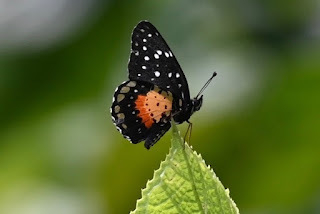 | ||
| Crimson Patch Butterfly (chlosyne janais; Costa Rica). |
Insects used to frighten me. Now I love them, and I am more concerned about losing them than living with them.
At the end of the article I've offered some tips about how to ensure we have a happy future together with the insects and other arthropods around us. Enjoy.
(Image copyright 2022 David L. O'Hara)
Watching the Fish
I've been publishing some short pieces on Medium lately. It's a way of doing some quick writing about things I've taught about for years.
This latest one is about watching fish, and I hope you enjoy it. Here's a sample:
I love fish. And whenever I say that, most people assume I love either eating fish or catching them. But neither of those is what I mean.
What I mean, more than anything, is that I love watching them at home in the places where they live.
You can find the whole article here.
On The Religious Architecture of Water
One of my recent articles on Medium. Here's a sample:
If you want to know what someone believes, don’t ask them what they believe. Ask them where they spend their time, energy, and money.
Because the things that we genuinely believe are things we act on.
And soon the landscape around us becomes the outward form of our inward beliefs.
ArcGIS Storymap of Environmental Studies at Augustana
Since all my Environmental Studies students learn GIS, I’ve been trying to gain some new skills, too. The ArcGIS Storymap tool is a lot of fun to work with, and I’ve been playing around with using it to tell stories both with and without maps. Here’s one I made for the Environmental Studies program itself. I’d love to hear feedback about what we can do to improve this.
IBM Developer and Call For Code
It was a delight to work on designing last year's Call For Code challenge with IBM Developer, and then to participate in judging the entries. But I think the best part was joining my team in NYC to watch the university awards!
Our students Onajite Taire and Gedion Alemayehu impressed us--and others, plainly--with their Mile 12 app.And of course it was wonderful that my university, my colleagues, and
I received some recognition for our contributions as well.
Dr. Matthew Willard gives his time generously to Augustana students and to students around the world. The two of us love seeing students try new things that aim at the common good.
https://developer.ibm.com/blogs/announcing-the-2021-call-for-code-engagement-awards/
IBM’s Call for Code 2021
IBM just released their latest "Call for Code." If you have a team with some coding skills and you want to put them to use helping others to tackle some intractable problems, click that link and dive in!
I have a particular passion for clean water, but each one of the problems they're inviting people to work on are worthy of our time and attention.
Peirce, Religion, and Communities of Inquiry: Jeffrey Howard interviews me for his latest podcast
Recently I had the pleasure of talking with Jeffey Howard on his Damn The Absolute! podcast. We mostly talked about Charles Sanders Peirce, pragmatism (or "pragmaticism" as Peirce called it), religion, and communities of inquiry.
You can listen to our conversation here.
Catch Your Breath: A Winter Meditation on Trout - My latest article, in Hothouse
My latest publication, a winter meditation on the beauty of brook trout, in Hothouse // Solutions. This is my first publication in collaboration with my son, Michael O'Hara, my favorite pro photographer.
A little taste of my article:
The trout is, for me, an icon of what I hasten to ignore.
I hope you enjoy this short read. Consider subscribing to Hothouse.
We can all use good news, after all. I like the short format and the focus on solutions, not just on problems.
Of course, if you like what I've written here, you might also like my book on brook trout.
My Father's Stories
Dear Dad,
We recently had a conversation about what kind of wisdom comes with age. We’ve both known some old people who seem unwise, and some young ones who are ahead of the game. And I think you and I (both of us now being over the trusted age of thirty) have occasionally been unwise in our post-adolescent days. Oh, well.
While I’ve known a few foolish geezers, over the years my respect for a certain kind of wisdom I see in you has continued to grow: your stories. Again and again when I have faced uncertainties in my life, I have returned to your stories.
Your stories aren’t doctrines, because that’s not what stories are. So I’m not saying they’re right or wrong. What matters is that they’re yours, and when you tell stories about your own life, they’re some of the truest stories I can imagine. You only mess them up when you try to explain them. That’s best left for Aesop. Your stories are more like compressed data. They do more work than any quantum computer I’ve heard of can do, and they are like a vein of gold that keeps growing and branching the more I dig into it. They explain themselves, and they are resilient.
Some of your stories are entertaining. My kids have heard stories of your experience in the National Guard so many times they probably not only think that I was there with you in that tank, they probably can imagine themselves in there, firing at trees hundreds of yards away in target practice.
But your stories do much more than entertain. They teach. When I think of you riding in the back seat of the car while your parents heard the news of the bombing of Pearl Harbor and you wouldn’t shut up, I feel like I am present there, and I feel like I am learning about my family, and what it means to be a family. You’ve never told me what Gram did when you were making too much noise, but that doesn’t stop me from remembering what I know of her, and imagining her response. And you haven’t mentioned your brother in that story either, but I can imagine him learning a lesson as well when Gramps turned around and smacked you to get you to shut up while he contemplated what was about to become of his military service, and of his wife and sons, and his widowed mother and his younger siblings. Just reflecting on that makes me think more seriously about my own obligations to others. It’s a tightly-packed story that is full of webs of relationships, and I am grateful for every time you’ve told me.
The same goes for all the stories you’ve told me about your life during the war, and afterwards. The way Gramps prepared you all for the trip back home while he prepared himself and his men for war. The way Uncle Charlie taught you to use the tools he knew. You’ve told me about Uncle Charlie so many times I wish I knew him myself. In fact, I think I do, through you.
Because, after all, your stories are also like tools. I think about the stories you’ve told me about how to take an engine apart so that you can put it back together again. I remembered that when I took apart my lawn mower engine once, and I thought about it the other day when I took apart the vacuum cleaner to figure out why it wasn’t working. I took out the parts methodically, and laid them out in order of removal, so that I could put them together again. You taught me about algorithms when I was a kid, sketching some out on napkins at the pizzeria in Woodstock, but also teaching me the word “algorithm” and then telling me stories that illustrated algorithms. You were making me a philosophy professor whether you knew it or not. Not bad for an electrical engineer!
A few years ago my youngest brought his friend over to our
house. Her car door wasn’t working right. He told her to park it in the
driveway and said that his dad could fix it. Somehow he knew that I wasn’t
afraid to take things apart and tinker with them. He also knows that I still
own and use tools you gave me when I was a boy. As we took apart that car door
there in our driveway, Matt watched and learned. Not long afterwards, when he
wanted to fix something on his own car—something he had never done before—he asked
to borrow my tools, and got to work. He was unafraid to use tools, and unafraid
to try something new. You know why? Because he saw it in me. And you know what
he saw in me? He saw you. Your stories—the ones you told and the ones you
showed me—those live in me all the time. Not surprisingly, he's now certified as an automotive electrician, and working as an auto mechanic. And he's good at his job. That's a picture of your stories, living in your grandson. I hope you're as proud of him as I am.
I think one of the things I have learned from your stories is a willingness to try to work with my hands to make good things. I’ve made a lot of the furniture in our house, and as you know, I’ve worked with stone and bricks and mortar on three different continents now. When I lay stone, I am always thinking about the structure in front of me, thinking about stresses and balance, physics and aesthetics. Despite a lack of formal training in engineering, standing beside you while you built a pier on the reservoir, or while you explained the bridge you built across the creek behind your house, gave me both the gumption to try building things myself, and a sense of what would work and what wouldn’t. Of course, that bridge also came with a lesson in law (which is why you couldn’t modify the banks) and a lesson in measuring the rate of flow of a river (something I had no idea how to do until you told me that day.) I can’t look at bridges and cantilevered and suspended structures without thinking of the engineering lessons you taught me through your stories.
The same is true for my adeptness with languages, and for my ability with music. Yeah, some of that is probably genetic (from you, again) but a lot of it is just learned fearlessness. I have never seen you turn away from a musical instrument just because you hadn’t yet received lessons in it. And I’ve seen you play in public many times, and your stories—I want to emphasize this—your stories of messing up have been a huge gift. “Don’t stop, just keep playing!” This is one of the things I tell my students now about public speaking, and about writing essays. “Always have a song you’re ready to play.” Years ago when I was having dinner at the home of the Lutheran Bishop of Nicaragua, someone handed me a guitar and said “Play us a song.” This was a complete surprise to me, but thanks to your stories, I was ready, and I led the whole group in several songs.
If I tried to write down all the stories you’ve told me, it would take a long time. I hope you continue to write down the stories you know. And I hope you tell them simply, unadorned, without feeling like they need to be dressed up. Just pick up that guitar and sing them, Dad. You have such a good voice, such a gift for music. You’re our family’s Homer, our Vergil.
In the same vein, if I tried to write down all the ways you show up in my classes, or in the ways I raised my kids, I doubt I’d be able to get it all down, but I hope this little letter at least gives you an idea of that. Those napkins you scribbled on at the pizzeria helped my kids do better in math and science. The times you told me about meeting someone who spoke another language and you tried speaking to them have indirectly emboldened your grandkids to study and work abroad in Asia, Africa, Latin America, and Europe. You taught me my first lessons in logic, and I taught them to my kids, and then your granddaughter grew up to be a far better reasoner than either one of us. Hopefully you and I will get a little credit for that when her biography is written—a little, but not too much. She deserves most of the credit for taking the stories we passed on, unpacking them, and then retelling them in her own way. And I love to watch her do that.
Speaking of languages, your stories have taught me in some other ways, too. Well before I could read Chomsky you mentioned him to me. I don’t remember what you said, but I remember the way you said it. It was like when you mentioned Feynman, Bernoulli, Les Paul, Vivaldi, Buckminster Fuller, Linus Pauling, or one of the other creative thinkers you were the first person to teach me about. Years later, when I was teaching at Penn State, one of my students mentioned Chomsky, and said wistfully that she wished she could have the chance to meet him. I asked her “Have you tried writing to him or giving him a call?” “I can do that?” “Why not?” I was passing along to her some of your willingness to try. After she went home to Boston for semester break she came to visit me in my office, and told me that she had called him and he invited her over to his campus. They talked for an hour over coffee. She was thrilled! That’s a win in your column, Dad. Well done.
When I was a boy you also bought me a subscription to Scientific American, and a copy of Van Nostrand’s Scientific Encyclopedia. I wish I still had that Van Nostrand’s. It’s horribly out of date, but I spent many hours paging through it, and it was a gift of love. People don’t often think of science as stories, but what else are scientific papers? They’re letters written to strangers, telling stories as clearly and as straightforwardly as they can. I remember reading about the work of Benoit Mandelbrot in Scientific American, and I have not stopped learning from that story ever since. If I had a list of how many times I’ve taught principles I learned from those articles, it would be a very long list. Another win in your column, I think.
I could go on for a long time, but I have more work to do today, so I’ll end here. I just wanted to say, in the form of a letter about stories, that I love you. Thanks for telling your stories, Dad. I keep telling them all the time.
With love,
Dave
*******
I write about my father in several places, including in my book Downstream. If you want to see some more of what I've written about him on this blog, click the "my Dad" link, below.
Of Fish and Forests
When people ask me what I do I sometimes reply “I study the relationships between fish and forests.”
A more precise way to describe my job might be to say I’m a teacher, a scholar, and a department chair and program director at my university. But that answer is pretty dry and uninteresting.
Adding detail doesn’t always help, though I could say that I teach philosophy, classics, religious studies, theology, field ecology, study abroad, environmental studies, and sustainability; and that I take my students to the places I study: rainforests in the tropics and in Alaska, deserts, and the Mediterranean.
So instead I say “fish and forests.” The words are simple and easy to understand. I hope they invite more questions, and often they do.
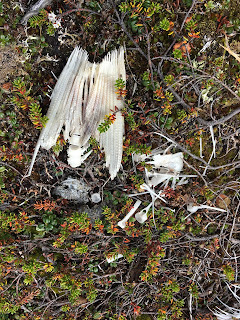 |
| Salmon bones on woody plants beside a river near Lake Clark, Alaska. A bear left these bones after a meal. |
The question I hope for is some version of “what do fish have to do with forests?” The short version is: nearly everything.
Nearly as good as that question is when someone points out that fish don’t live in trees. Short version of my reply: that’s not exactly true, and many of my students can tell you the various ways fish do live in trees. Here are a few:
Around the world, the edges between land and water are held together by roots, and in those places, fish find food, shelter, and places to spawn.
A great example of this is mangroves, which are some of the most important ocean nurseries. Thousands of species bear their young and lay their eggs in mangroves. The mangroves provide shelter from predators; they stabilize the soil, protecting land from hurricanes and strong waves, and protecting the sea from too much runoff. Birds, mammals, insects, and reptiles live in the branches. Fish and myriad aquatic invertebrates live among the roots.
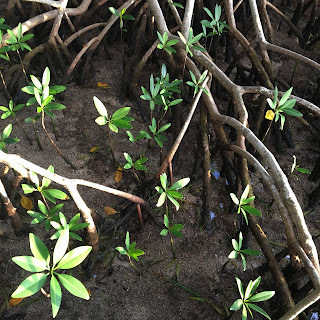 |
| A mangrove on an island off the coast of Belize. |
We could add that there are “forests” of kelp and coral underwater, too.
Wherever birds eat fish, those birds also build the soil when they return to the land. Their waste becomes fertilizer for all manner of grasses, forbs, and trees. Visit the rivers of Alaska and you will find shrubs and trees growing on the banks, where seeds found fertile gardens in mounds of bear poop.
When a bear eats salmon and berries, the berry seeds pass through the bear undigested. The bear deposits the seeds in a steaming pile of fecundity. Bears are forest gardeners.
Here in the middle, between the tropics and the Arctic, the
Big Sioux River is entering its quiet winter’s rest. We haven’t had much rain,
and the river is ankle-deep in many places. The fish gather in deep holes that were
sculpted out by fallen trees. When the river claims a tree, that tree doesn’t
simply float away. It becomes food for beavers and decomposing insects. It
creates eddies that dig deep holes on one side and deposit sediment on the
other. Sometimes the tree becomes a new island, and new trees grow up on its
rotting wood and on the debris it collects. Raccoons grab mussels and crayfish,
and eat them in the branches. Mink and otters dine from a similar menu further
down on the bank.
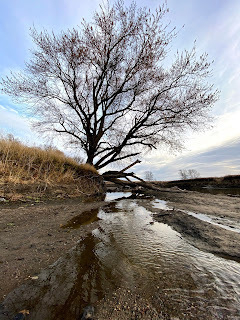 |
| Tree growing on an island in the Big Sioux River. The tree makes habitat for both terrestrial and aquatic life. |
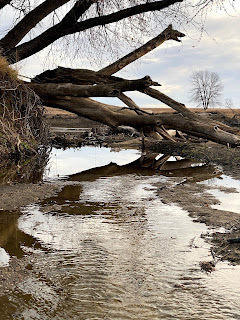 |
| Near the roots, a deep hole has been carved out. Habitat for fish, hunting grounds for raccoons and other mammals. |
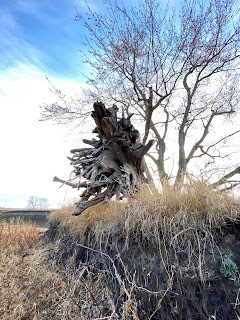 |
| A fallen tree has created an island in the Big Sioux River |
Everywhere I go with my students I ask them to pay attention to the water. The fish and the forests alike need it. The forests keep the water cool and clean, and the fish fertilize the trees. Often, when I am teaching in Morocco or Spain or Greece, I ask them to notice the architecture of water, and the way it relates to our values. Religions have rituals of ablution, and ancient temples collect water from their rooftops, letting it flow down ancient marble columns that imitate the tree trunks that once made porticoes, to flow into cisterns. The narrative of the Christian scriptures begins in a forested garden, and ends in a city with a river flowing through it.
My students smile and roll their eyes at hearing me repeat the same question yet again. What do fish have to do with forests? What does water have to do with dry ground?
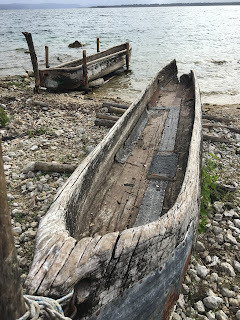 |
| Traditional Itzá canoes on the shore of Lake Petén Itzá. |
And then one will point out a young mangrove shoot, a migrating salmon, a traditional Itzá canoe on a lakeshore, a baptismal font, a hammam, a public fountain, a Roman aqueduct.
And we will all stop for a moment and consider the way that this water, right here, flows through every part of our lives.
One Word
One Word
One word to the finches
Who perch on my towering sunflowers,
Who fling golden petals,
Who drop a thousand husks
On the garden below.
Who dive at my coneflowers, talons out
And then peck and pull and shred
Those spiny, spiraled heads.
It is September now, but I know
That you and others of your kind
Will be back again, and again
Perching in the branches
All fall, and all winter too.
And you will continue to feast
On the dry seeds that remain.
What was a colorful garden is becoming
Your harvest meal, your stores for winter,
And you don't care how much I worked
To make this garden grow.
The earth I turned, the soil I amended,
The compost churned, the toil.
The seeds I raised inside while you sat
On brown stems, looking in my windows.
The seedlings planted, and watered,
And watched until they grew.
I have just one word for you:
Welcome.
When you leave today I'll gather
A few of those seeds myself
And I'll set them aside to dry
So that next spring you, and I
Can begin to grow again.
—-
David L. O'Hara
19 September 2020
